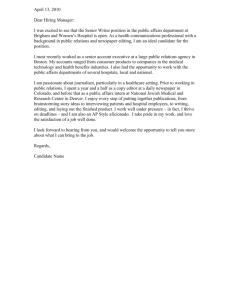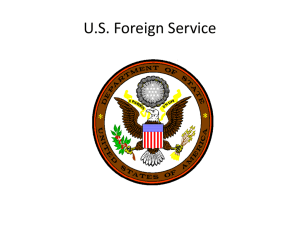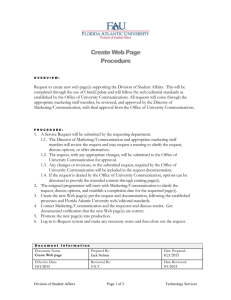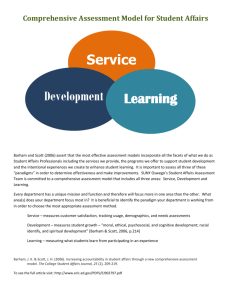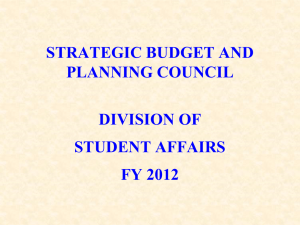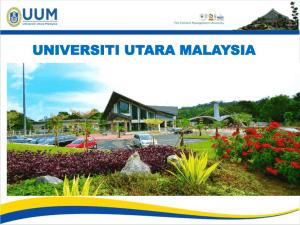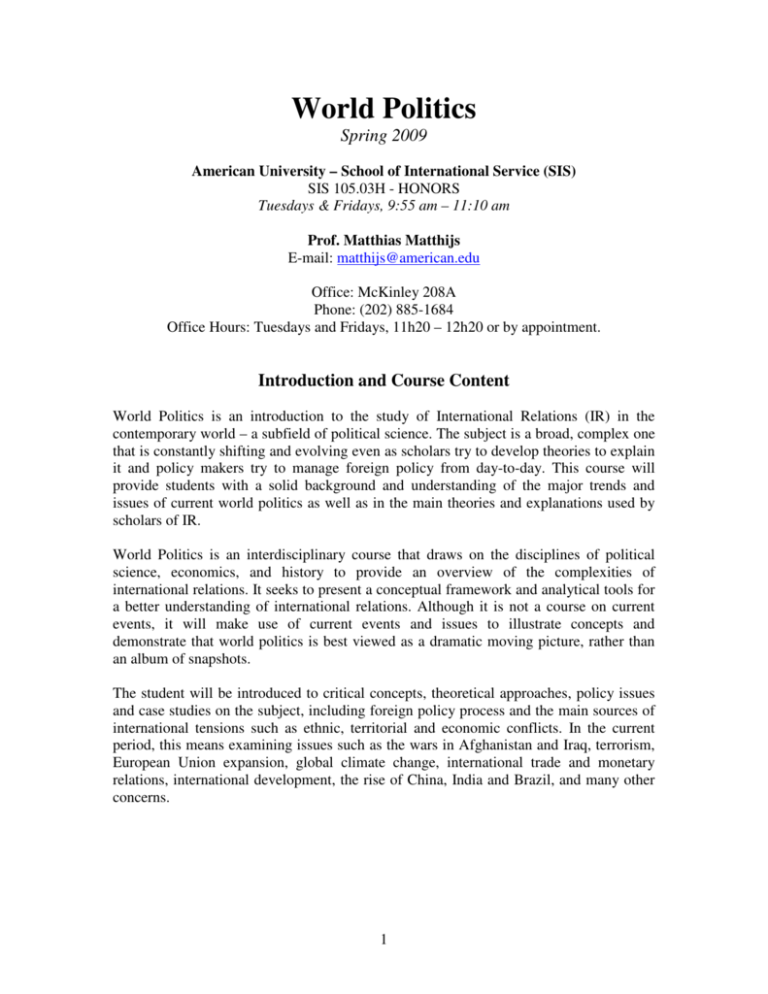
World Politics
Spring 2009
American University – School of International Service (SIS)
SIS 105.03H - HONORS
Tuesdays & Fridays, 9:55 am – 11:10 am
Prof. Matthias Matthijs
E-mail: matthijs@american.edu
Office: McKinley 208A
Phone: (202) 885-1684
Office Hours: Tuesdays and Fridays, 11h20 – 12h20 or by appointment.
Introduction and Course Content
World Politics is an introduction to the study of International Relations (IR) in the
contemporary world – a subfield of political science. The subject is a broad, complex one
that is constantly shifting and evolving even as scholars try to develop theories to explain
it and policy makers try to manage foreign policy from day-to-day. This course will
provide students with a solid background and understanding of the major trends and
issues of current world politics as well as in the main theories and explanations used by
scholars of IR.
World Politics is an interdisciplinary course that draws on the disciplines of political
science, economics, and history to provide an overview of the complexities of
international relations. It seeks to present a conceptual framework and analytical tools for
a better understanding of international relations. Although it is not a course on current
events, it will make use of current events and issues to illustrate concepts and
demonstrate that world politics is best viewed as a dramatic moving picture, rather than
an album of snapshots.
The student will be introduced to critical concepts, theoretical approaches, policy issues
and case studies on the subject, including foreign policy process and the main sources of
international tensions such as ethnic, territorial and economic conflicts. In the current
period, this means examining issues such as the wars in Afghanistan and Iraq, terrorism,
European Union expansion, global climate change, international trade and monetary
relations, international development, the rise of China, India and Brazil, and many other
concerns.
1
The main objectives of the course are:
1. to impart an understanding of International Relations focusing primarily on
theoretical approaches to the subject;
2. to provide an appropriate historical and contemporary context for understanding
International Relations and its key subfields;
3. to critically review recent changes in the practice of International Relations, both
regionally and globally.
World Politics is one of the “foundation courses” in the university’s General Education
Program in Curricular Area 3 – Global and Multicultural Perspectives; it is the first of a
two-course sequence. In order to complete the sequence, students should take one of the
following second-level courses in Cluster One – Global Perspective:
COMM-280G
EDU-285G
GOVT-235G
HIST-225G
IBUS-200G
LFS-200G
SIS-215G
SIS-220G
SIS-255G
SOCY-225G
Contemporary Media in a Global Society
Education for International Development
Dynamics of Political Change
Russia: Past and Present
The Global Marketplace
Russia and the United States
Competition in an Interdependent World
Confronting Our Differences/Discovering Our Similarities: Conflict Resolution
China, Japan and the United States
Contemporary Arab World
Each of these courses explores in more depth a topic introduced in World Politics.
Required Book
(Available for purchase)
Joshua S. Goldstein and Jon C. Pevehouse (2008), International Relations (Pearson
Longman, 8th edition)
Recommended Texts
Additional readings or articles will be available on e-reserves through Blackboard:
http://blackboard.american.edu (look under “course documents”)
Note: Each week’s core reading is the corresponding chapter in the Goldstein/Pevehouse
book. Material from the textbook may be on the exam even if we do not discuss it in
class. Some reading assignments may change over the course of the semester to address
changing world events. Journal articles are offered to help expand your understanding of
the week’s topic and to provide additional perspectives on the main issues of discussion.
You should also try to keep up to date with world news by reading any of the following
quality newspapers: the Financial Times, New York Times, Washington Post, Wall Street
Journal or the Economist.
2
Course Requirements
This class endeavors to promote each student’s writing skills and, to a lesser extent, each
student’s speaking and presentational skills. Writing assignments and class discussions
are aimed at helping each student sort through new ideas. In order to facilitate this
learning, students in this course are required to attend and participate in lectures, do the
assigned readings, take the mid-term and final examination on the specified dates, and
turn in written papers of their own, original work on the specified dates.
In order to successfully complete this course, each class participant is required to:
•
•
•
•
•
Do the readings, attend all classes and participate actively in class (10% of the
final grade);
Write a Critique of an Article on International Affairs (15% of the final grade)
(Due February 20);
Complete the Mid-Term Examination (25% of the final grade) (March 6);
Write a Policy Memo to the Obama Administration’s National Security Adviser
(15% of the final grade) (Due April 21);
Complete the Final Examination (35% of the final grade) (May 5).
Both written assignments are REQUIRED for this course. In both cases, full instructions
and guidelines will be emailed to you beforehand detailing expectations for the
assignment. Late papers will be marked down one letter grade. However, extensions
may be granted under very special circumstances.
Grading Summary and Standards of Performance Evaluation
All assignments must be completed to pass the course. Evaluation of your performance in
this course, which will determine your final grade, will be guided by the following
criteria:
A or A-:
Demonstration of superior work (written and oral) in fulfillment of course
requirements; improvement during the semester will be weighed in evaluation, class
participation; demonstration of reading assignments; good attendance.
B+, B or B-: Excellent work (written and oral) in fulfillment of course requirements;
improvement during the semester will be weighed in evaluation; good attendance.
C+, C or C-: Satisfactory work (written and oral) in fulfillment of course requirements.
D:
Assigned work is not satisfactory or not completed and/or student fails to
meet minimum attendance requirements.
F:
Failure to meet minimum course goals – written assignments, class
participation, and other course requirements.
3
Academic Integrity Code Statement Overview
All students are governed by American University’s Academic Integrity Code. The
Academic Integrity Code details specific violations of ethical conduct that relate to
academic integrity. By registering, you have acknowledged your awareness of the
Academic Integrity Code, and you are obliged to become familiar with your rights and
responsibilities as defined by the Code.
All of your work (whether oral or written) in any and all classes is governed by the
provisions of the Academic Integrity Code. Academic violations include but are not
limited to: plagiarism, inappropriate collaboration, dishonesty in examinations whether
in-class or take-home, dishonesty in papers, work done for one course and submitted to
another, deliberate falsification of data, interference with other students’ work, and
copyright violations.
The adjudication process and possible penalties are listed in American University’s
Academic Integrity Code booklet, and is also available on the American University
website (http://www.american.edu/academics/integrity/code.htm). Being a member of
this academic community entitles each of us to a wide degree of freedom and the pursuit
of scholarly interests. With that freedom, however, comes a responsibility to uphold the
highest ethical standards of scholarly conduct.
4
Class Schedule
Class One – January 13/16
Introduction – Overview of the Course – History, Actors and Levels of Analysis
Required:
-Goldstein & Pevehouse, Chapter 1
*** Note: No Class on January 20 (Inauguration Day) ***
Class Two – January 23/27
Power Politics, Realism, and Hegemony
Required:
-Goldstein & Pevehouse, Chapter 2
-Michael Lind, “Beyond American Hegemony,” The National Interest, May/June 2007
-Parag Khanna, “Waving Goodbye to Hegemony,” New York Times, 28 January 2008
Class Three – January 30/February 3
Alternatives to Realism: Liberalism, Feminism, Peace Studies, and Postmodernism
Required:
-Goldstein & Pevehouse, Chapter 3
-Marina Ottaway and Thomas Carothers, “Think Again: Middle East Democracy,”
Foreign Policy, Nov/Dec 2004
-Daniel Deudney and G. John Ikenberry, “The Myth of the Autocratic Revival,” Foreign
Affairs, Jan/Feb 2009
Class Four – February 6/10
Foreign Policy: the Bush Doctrine and the Emerging Obama Doctrine
Required:
-Goldstein & Pevehouse, Chapter 4
-Anatol Lieven, “Liberal Hawk Down,” The Nation, October 25 2004
-J. Anthony Holmes, “Where Are the Civilians?” Foreign Affairs, Jan/Feb 2009
-Ivo H. Daalder and I. M. Destler, “In the Shadow of the Oval Office, Foreign Affairs,
Jan/Feb 2009
5
Class Five – February 13/17
International Conflict and Terrorism
Required:
-Goldstein & Pevehouse, Chapter 5
-John Mueller, “Is there still a Terrorist Threat?” Foreign Affairs, Sep/Oct 2006
-Robert M. Gates, “A Balanced Strategy,” Foreign Affairs, Jan/Feb 2009
-Walter Russell Mead, “Change They Can Believe In,” Foreign Affairs, Jan/Feb 2009
* Critique of Article on International Affairs Due *
* February 20 *
Class Six – February 20/24
Military Force, Terrorism and the Iraq War
Required:
-Goldstein & Pevehouse, Chapter 6
-Larry Diamond, “What Went Wrong in Iraq,” Foreign Affairs, Sep/Oct 2004
-James D. Fearon, “Iraq’s Civil War,” Foreign Affairs, Mar/Apr 2007
-Richard N. Haass and Martin Indyk, “Beyond Iraq,” Foreign Affairs, Jan/Feb 2009
Class Seven – February 27/March 3
International Law, the United Nations, and Human Rights
Required:
-Goldstein & Pevehouse, Chapter 7
-Madeline Albright, “The United Nations: Think Again,” Foreign Policy, Sep/Oct 2003
-Kofi Annan, “‘In Larger Freedom’: Decision Time at the UN,” Foreign Affairs, May/Jun
2005
-Michael Chertoff, “The Responsibility to Contain,” Foreign Affairs, Jan/Feb 2009
Friday March 6
Midterm Examination (in class)
*** Note: No Classes on March 10 and March 13 (Spring Break) ***
6
Class Eight – March 17/20
International Trade
Required:
-Goldstein & Pevehouse, Chapter 8
-David Dollar and Aart Kraay, “Spreading the Wealth,” Foreign Affairs, Jan/Feb 2002
-John Gray, “The World Is Round,” New York Review of Books, August 2005
-Aaditya Mattoo and Arvind Subramanian, “From Doha to the Next Bretton Woods,”
Foreign Affairs, Jan/Feb 2009
Class Nine – March 24/27
International Finance
Required:
-Goldstein & Pevehouse, Chapter 9
-Jagdish Bhagwati, “The Capital Myth: The Difference between Trade in Widgets and
Dollars,” Foreign Affairs, May/Jun 1998
-Niall Ferguson, “Wall Street Lays another Egg,” Vanity Fair, December 2008. <Online
Available at: http://www.vanityfair.com/politics/features/2008/12/banks200812 >
-Roger C. Altman, “The Great Crash, 2008,” Foreign Affairs, Jan/Feb 2009
Class Ten – March 31/April 3
International Integration
Required:
-Goldstein & Pevehouse, Chapter 10
-Robert Pozen, “Mind the Gap,” Foreign Affairs, Mar/Apr 2005
-Laurent Cohen-Tanugi, “The End of Europe,” Foreign Affairs, Nov/Dec 2005
-Tony Judt, “In Defense of Decadent Europe,” Brookings Institution, November 2005
-Anne-Marie Slaughter, “America’s Edge,” Foreign Affairs, Jan/Feb 2009
Class Eleven – April 7/10
Global Environment, Population and Health Issues
Required:
-Goldstein & Pevehouse, Chapter 11
-Tony Judt, “The Wrecking Ball of Innovation,” New York Review of Books, Dec 2007
-John Gray, “The Global Delusion,” New York Review of Books, April 2006
-Laurie Garrett, “The Lessons of HIV/AIDS,” Foreign Affairs, Jul/Aug 2005
-Extra Readings on Global Warming (available on Blackboard)
7
Class Twelve – April 14/17
The North-South Gap
Required:
-Goldstein & Pevehouse, Chapter 12
-Geoffrey Garrett, “Globalization’s Missing Middle,” Foreign Affairs, Nov/Dec 2004
-John Rapley, “The New Middle Ages,” Foreign Affairs, May/Jun 2006
-Robert Skidelsky, “Gloomy About Globalization,” New York Review of Books, April
2008
* April 21: Policy Memo to the National Security Adviser Due *
Class Thirteen – April 21/24
The Economics and Politics of International Development
Required:
-Goldstein & Pevehouse, Chapter 13
-Robert Skidelsky, “The Mystery of Growth,” New York Review of Books, March 2003
-Joseph Siegle, Michael Weinstein, and Morton Halperin, “Why Democracies Excel,”
Foreign Affairs, Sep/Oct 2004
-Nancy Birdsall, Dani Rodrik, and Arvind Subramanian, “How to Help Poor Countries,”
Foreign Affairs, Jul/Aug 2005]
Tuesday April 28
Last Class: Course Wrap-Up & Final Review
May 5: Final Examination (in class)
__________
8



